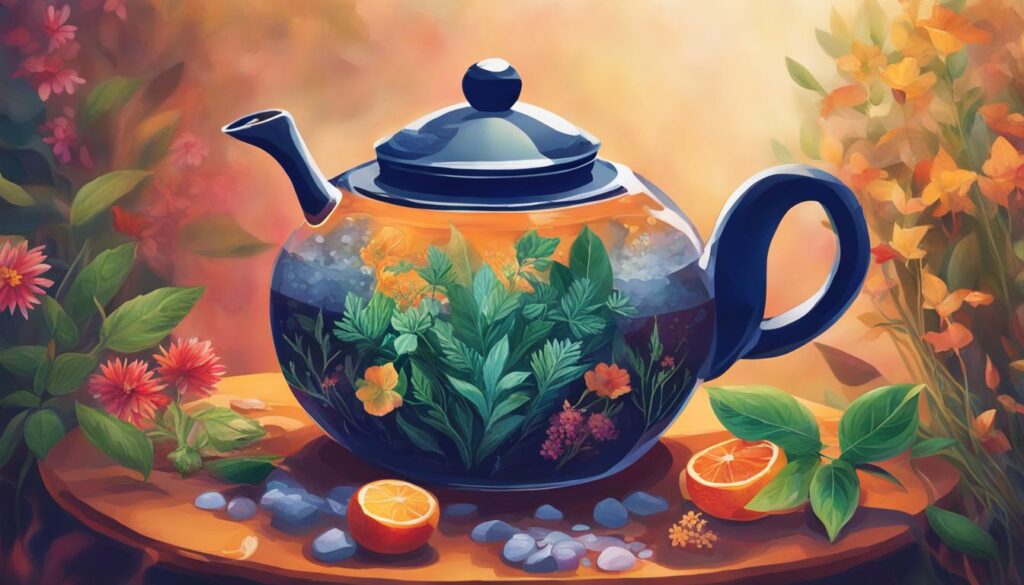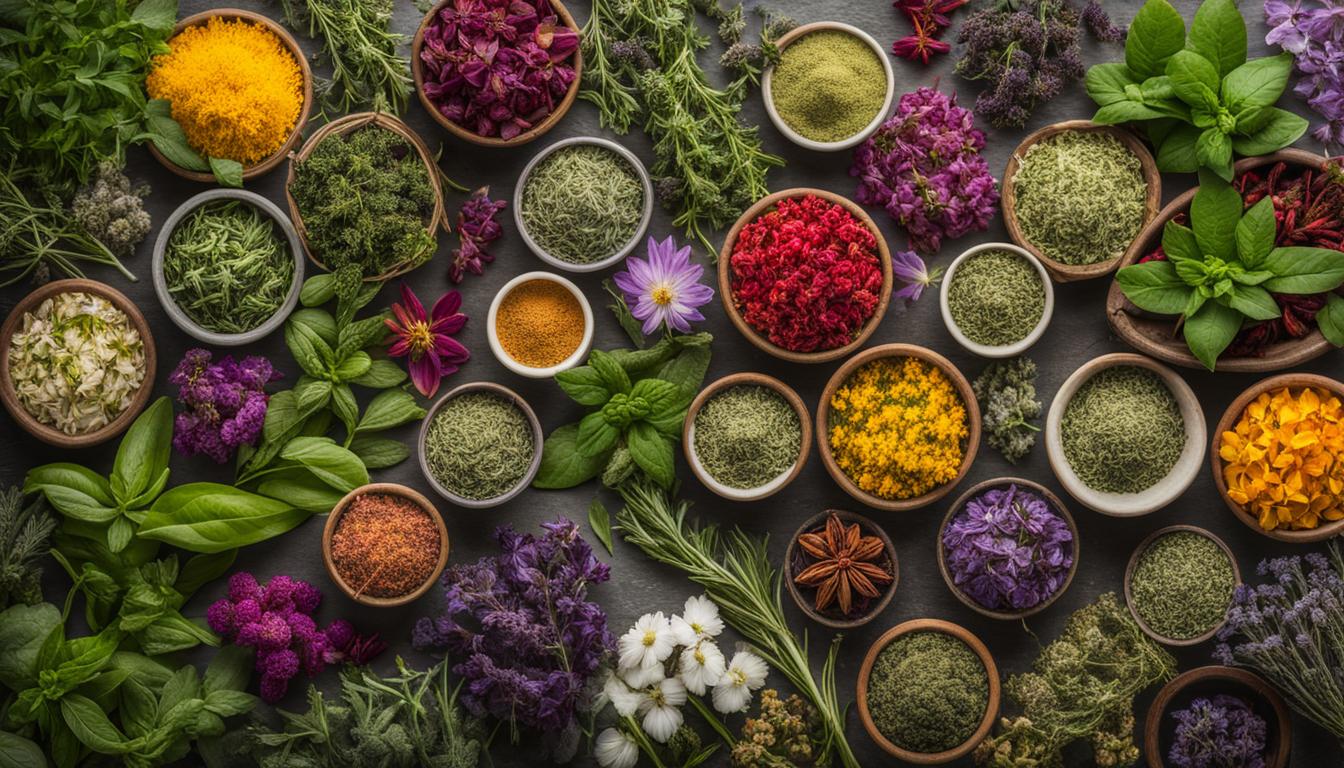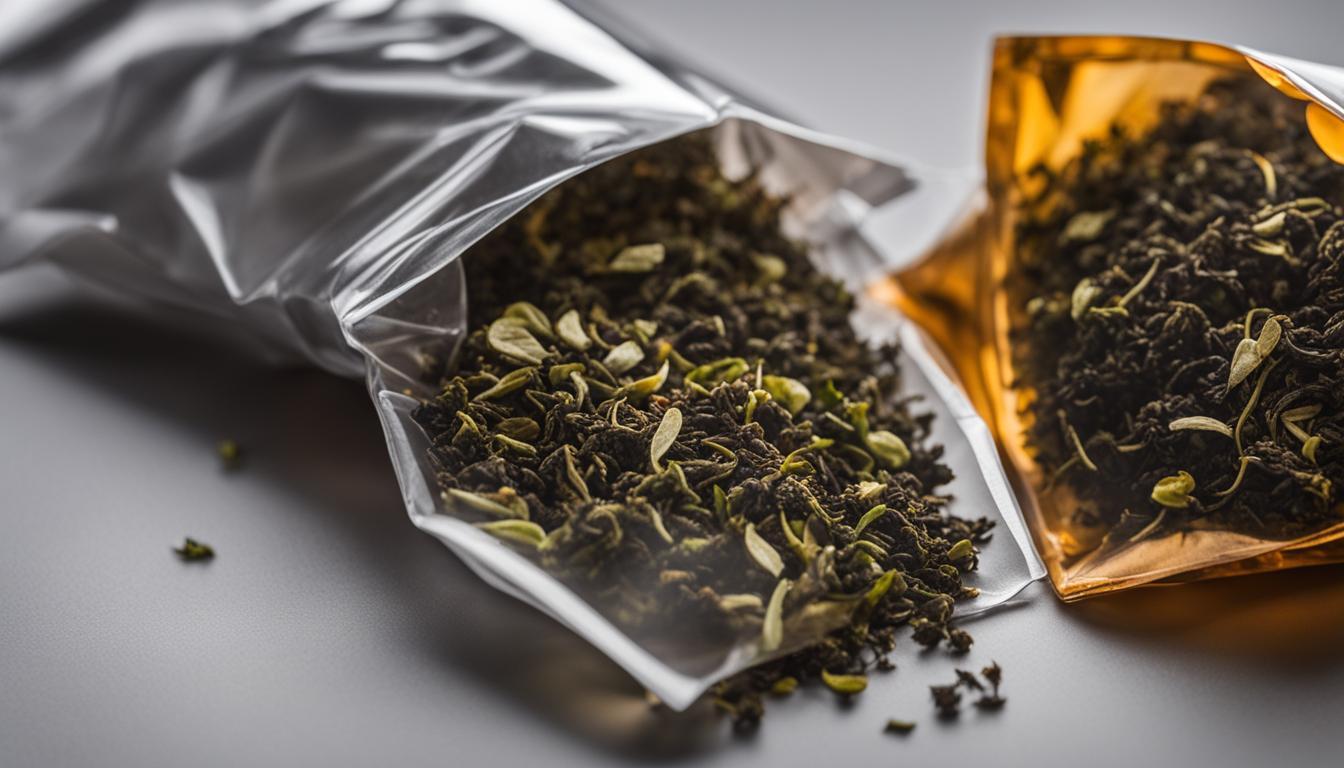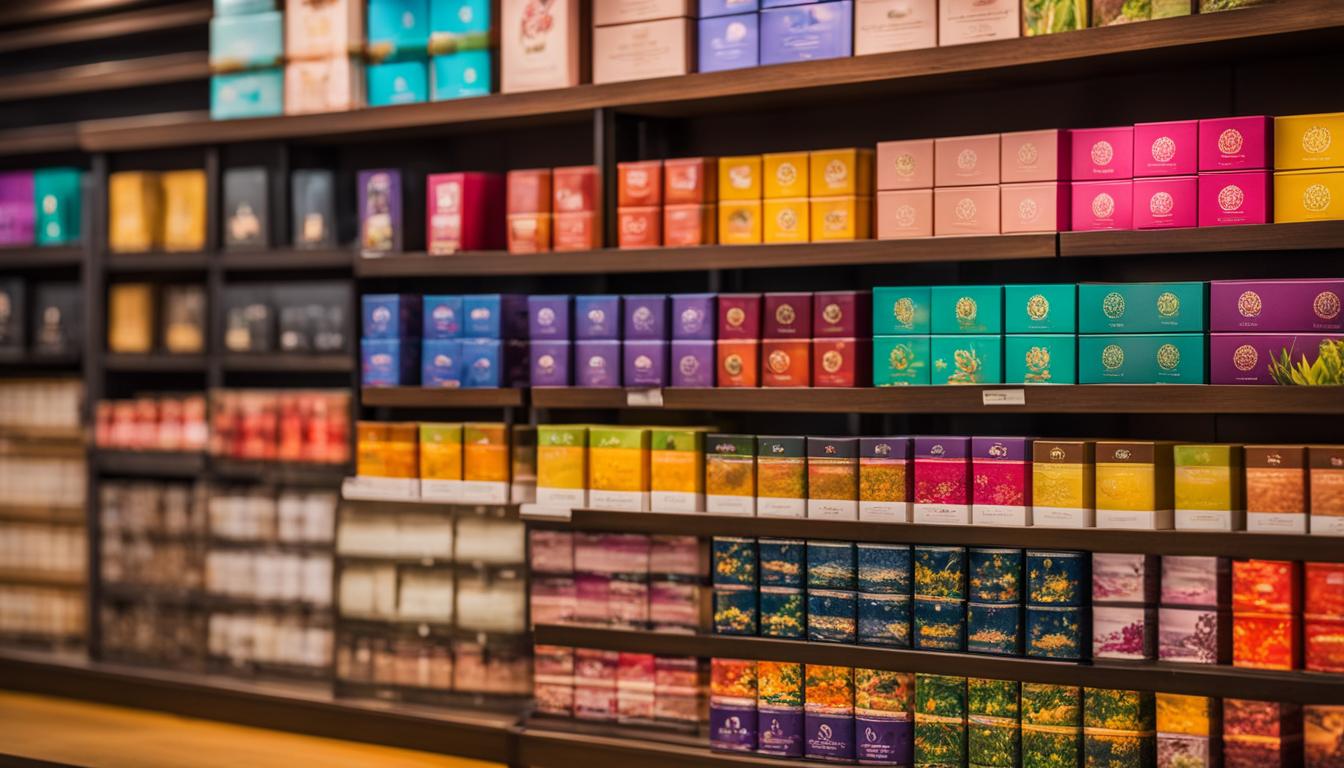Increased Popularity of Herbal Teas
The growing focus on health and wellness has led to a significant increase in the popularity of herbal teas. As consumers become more health-conscious, they are seeking natural and organic products that offer a range of health benefits. Herbal teas, such as chamomile, ginger, and green tea, have gained traction due to their wellness attributes and the perceived value they bring to a healthy lifestyle.
Our research shows that herbal teas are not only flavorful, but they also offer various health benefits. Chamomile tea, for example, has calming properties that can help with stress relief and improve sleep quality. Ginger tea is known for its anti-inflammatory and digestive benefits, while green tea is packed with antioxidants that support overall well-being.
“Consumers are increasingly turning to herbal teas as a natural and organic alternative to traditional caffeinated beverages. With their wide range of health benefits and the growing interest in holistic wellness, herbal teas have become a staple in many people’s daily routines.” – Tea Subscription Market Analyst
Embracing the Natural and Organic Movement
One of the reasons for the surge in herbal tea popularity is the increasing preference for natural and organic products. Consumers are becoming more conscious of the ingredients they consume and are actively seeking out options that align with their values. Herbal teas, being derived from natural plant sources, provide a guilt-free and nourishing alternative to conventional tea blends.
Tea brands that offer a diverse selection of herbal teas and effectively communicate their health benefits have the potential to tap into this growing market. By highlighting the natural and organic attributes of their products, tea companies can cater to the discerning tastes of health-conscious consumers and position themselves as trusted providers of wellness-enhancing beverages.
The Power of Wellness
The rising popularity of herbal teas can also be attributed to the overall wellness trend. In today’s fast-paced world, consumers are increasingly prioritizing self-care and looking for ways to support their physical and mental well-being. Herbal teas offer a convenient and enjoyable way to incorporate wellness rituals into daily routines.
“By incorporating herbal teas into our daily lives, we can enjoy the health benefits they provide while indulging in moments of self-care and relaxation. These teas not only taste great but also serve as a gentle reminder to take care of ourselves amid the hustle and bustle of modern life.” – Tea Subscription Market Expert
As the demand for herbal teas continues to soar, tea brands must stay on top of this emerging trend. By offering a wide range of herbal tea options, promoting their health benefits, and embracing the natural and organic movement, tea companies can establish themselves as key players in the thriving tea subscription service market.
Growing Demand for Functional Teas
Functional teas are gaining popularity among health-conscious consumers, thanks to their various health benefits. These teas are specifically designed to provide specific advantages, such as improved heart health and weight management. One example of a functional tea that has seen a surge in demand is turmeric tea. Turmeric, a spice known for its anti-inflammatory properties, is infused into tea to create a flavorful and health-promoting beverage.
Green tea is another type of functional tea that has been widely embraced by consumers. Rich in antioxidants, green tea offers numerous health benefits, including boosting metabolism, improving brain function, and reducing the risk of chronic diseases. With its refreshing taste and potential health advantages, green tea has become a staple in the diets of many health-conscious individuals.
“Functional teas, such as turmeric tea and green tea, offer a convenient and enjoyable way for individuals to support their overall well-being. By incorporating these teas into their daily routines, consumers can access the potential health benefits these tea varieties offer.”
Health Benefits of Functional Teas:
- Improved heart health
- Enhanced weight management
- Anti-inflammatory properties
- Boosted metabolism
- Improved brain function
- Reduced risk of chronic diseases
Functional teas are more than just beverages; they are a way for individuals to prioritize their health and well-being. As the demand for functional teas continues to grow, tea brands can capitalize on this trend by offering a variety of functional tea options and promoting the health benefits they provide. By doing so, they can attract health-conscious consumers who are seeking convenient and enjoyable ways to support their overall well-being.

Rise of Matcha Tea
The tea industry has witnessed a significant rise in the popularity of matcha tea, a type of green tea that is made from ground-up tea leaves. Matcha tea stands out for its distinct rich, creamy flavor and high antioxidant content.
“Matcha tea has become a sensation among health-conscious consumers, who are gravitating towards its numerous health benefits and its association with a holistic and healthy lifestyle,”
Social media platforms have played a vital role in promoting matcha tea and establishing it as a trendy beverage. Many influencers and wellness enthusiasts have embraced matcha tea and showcased its vibrant green color and frothy texture on their social media channels. The visual appeal and health properties of matcha tea have captured the attention of a wide audience, leading to its increasing popularity.
Tea brands that leverage the power of social media marketing can effectively tap into the growing demand for matcha tea. By showcasing matcha tea’s unique qualities, such as its antioxidant benefits and versatility in various recipes, tea brands can attract health-conscious consumers and build a strong presence in the market.
Matcha Tea vs. Green Tea
One common question that arises is the difference between matcha tea and regular green tea. While both are derived from the same plant, Camellia sinensis, matcha tea is grown and prepared differently, resulting in distinct characteristics and flavors. Matcha tea is made from shade-grown tea leaves, which stimulates the production of chlorophyll and enhances its vibrant green color. The leaves are carefully ground into a fine powder, which is then whisked with hot water to create a frothy and flavorful beverage.
Increased Focus on Sustainability
As sustainability becomes a top priority for consumers, the tea industry is placing a greater emphasis on sustainable practices. Tea brands are taking steps to minimize their environmental impact through initiatives such as using recycled packaging, sourcing tea from sustainable farms, and reducing water usage. By prioritizing sustainability, tea companies not only attract environmentally conscious consumers but also differentiate themselves in a competitive market.
Sustainability in the tea industry extends beyond just the product itself. Brands are now exploring innovative ways to reduce waste and promote recycling. Many companies have adopted eco-friendly packaging materials, such as biodegradable tea bags or recyclable tin containers, to reduce plastic consumption. By making these changes, tea brands demonstrate their commitment to sustainability and align with the values of their customers.
“Sustainability is no longer just a trend; it’s a necessity. As tea brands, it is our responsibility to make conscious choices that benefit both our customers and the planet.” – Tea Industry Expert
Additionally, tea brands are increasingly focused on sustainable farming practices. By sourcing tea from sustainable farms that prioritize organic cultivation methods and protect biodiversity, companies contribute to the preservation of natural resources and support the livelihoods of local communities. These sustainable farming practices not only enhance the quality of the tea but also ensure a more sustainable future for the industry.
| Sustainable Initiatives | Description |
|---|---|
| Recycled Packaging | Tea brands are using recycled materials for packaging to reduce waste and minimize environmental impact. |
| Sustainable Farming | Brands are sourcing tea from farms that prioritize organic cultivation methods and protect biodiversity. |
| Water Usage | Tea companies are implementing measures to reduce water consumption throughout the production process. |
Overall, the increased focus on sustainability in the tea industry reflects a broader shift in consumer behavior towards more responsible and eco-friendly choices. By embracing sustainable practices, tea brands can not only meet the demands of environmentally conscious consumers but also contribute to a more sustainable future for the industry as a whole.

Conclusion
In conclusion, the tea subscription service market is poised for significant growth in the coming years. As consumers become more health-conscious, they are increasingly drawn to the benefits of herbal teas, functional teas, and matcha tea. By offering a variety of these teas and effectively marketing their health benefits, tea brands can capitalize on this trend and attract a growing customer base.
Furthermore, digital trends are playing a crucial role in the tea subscription market. With the rise of social media, tea brands that leverage digital marketing strategies can reach a wider audience and create a strong online presence. Engaging with customers through captivating content, influencer partnerships, and interactive campaigns can help tea brands stand out and drive sales in a competitive market.
Lastly, sustainability has become a key consideration for tea consumers. By implementing sustainable practices like using recycled packaging, sourcing tea from sustainable farms, and reducing water usage, tea subscription services can appeal to environmentally conscious customers. This not only sets them apart from their competitors but also aligns with the values of a growing number of consumers who prioritize sustainability in their purchasing decisions.
Looking ahead, the tea market is expected to continue growing, fueled by these emerging trends and consumer preferences. With the right strategies in place, including a focus on digital marketing and sustainability, tea subscription services can position themselves as leaders in the industry and thrive in an ever-evolving market.
FAQ
What are the emerging trends in the tea subscription service market?
The emerging trends in the tea subscription service market include the increased popularity of herbal teas, growing demand for functional teas, rise of matcha tea, and increased focus on sustainability.
Why are herbal teas gaining popularity?
Herbal teas are gaining popularity because consumers are seeking natural and organic products that offer health benefits. Herbal teas, such as chamomile, ginger, and green tea, are known for their various health benefits.
What are functional teas?
Functional teas are specifically designed to provide health benefits such as improved heart health and weight management. Examples of functional teas include turmeric tea and green tea.
Why is matcha tea becoming so popular?
Matcha tea is becoming popular due to its rich, creamy flavor and high antioxidant content. It has gained traction on social media platforms, where it is often associated with a healthy and holistic lifestyle.
Why is sustainability important in the tea industry?
Sustainability is important in the tea industry because consumers are increasingly seeking sustainable products. Tea companies are adopting various sustainable practices, such as using recycled packaging, sourcing tea from sustainable farms, and reducing water usage.





